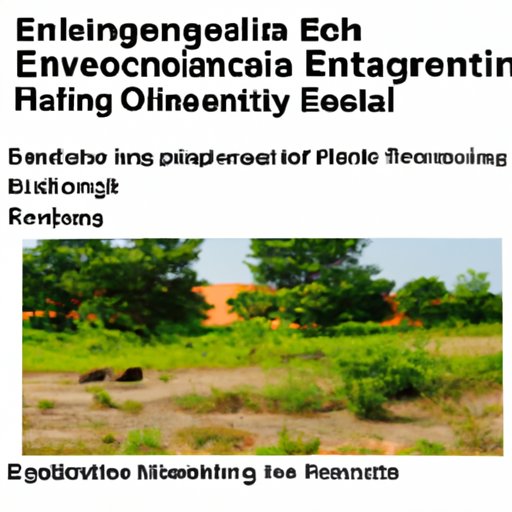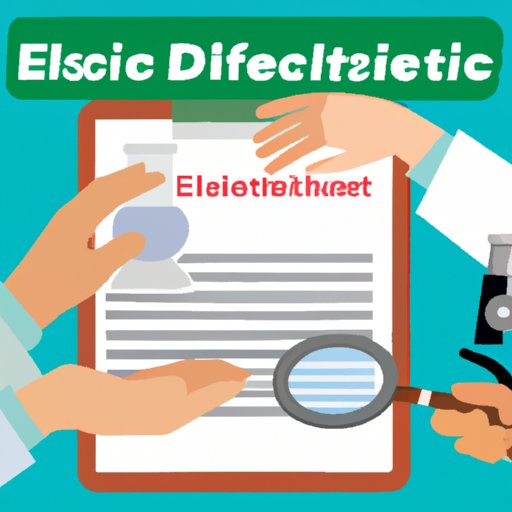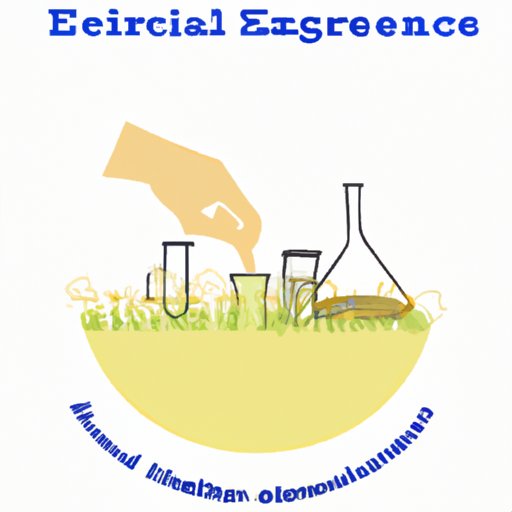Introduction
Environmental science is an interdisciplinary field that studies how natural systems interact with human activities and how they can be managed to benefit both people and nature. As such, it is essential to consider the ethical implications of any findings in this field before they are implemented in practice.
Ethics in environmental science involves examining the potential risks and benefits of scientific findings and exploring the implications of misuse or abuse of those findings. It also requires understanding ethical principles and guidelines as well as investigating the moral implications of research decisions. In addition, scientists have a responsibility to disclose their findings and be transparent about them.

Potential Impact of Environmental Science Findings on Society
The potential impact of environmental science findings on society is significant. For example, research into climate change has revealed the potentially devastating effects of global warming, including rising sea levels, droughts, and increased frequency of extreme weather events. These findings have led to calls for action to reduce emissions and mitigate the effects of climate change.
At the same time, environmental science can also bring about positive changes. For instance, advances in renewable energy technology have enabled us to reduce our dependence on fossil fuels and move towards a more sustainable future. Similarly, research into agricultural practices has led to improved methods of food production that are better for the environment.
However, the misuse or abuse of scientific findings can have serious consequences. For example, if research into climate change is used to justify policies that disproportionately affect certain populations, then this could lead to social injustice. Similarly, if findings from agricultural research are used to promote monoculture farming practices that damage biodiversity, then this could have a negative impact on ecosystems.

Role of Ethics in Environmental Science Research
In order to ensure that research findings are used responsibly and ethically, scientists must take into account the moral implications of their decisions. This includes understanding ethical principles and guidelines, such as those outlined in the Belmont Report, which outlines three core principles of ethical research: respect for persons, beneficence, and justice.
Respect for persons requires scientists to recognize the autonomy of individuals and treat them as equals, while beneficence entails taking actions that will benefit others. Finally, justice requires that research decisions be made in a fair and equitable manner, taking into account the needs of all affected parties.
It is also important for scientists to consider the potential impact of their research on vulnerable populations, such as those living in poverty or marginalized communities. They must ensure that their findings are not used to exploit these groups or cause any harm.

Ethical Responsibility of Scientists to Disclose Findings
In addition to considering the ethical implications of their research decisions, scientists also have a responsibility to disclose their findings and be transparent about them. This means making sure that information is readily available to the public and that any conflicts of interest are disclosed. For example, if a scientist’s research is funded by a company with a vested interest in the outcome of the research, then this should be made clear.
Transparency is essential in order to ensure that research findings are used responsibly and ethically. Without it, there is no way to guarantee that scientific knowledge is not being misused or abused. Furthermore, withholding information can have serious consequences, such as preventing the development of new treatments or technologies that could benefit society.
Consequences of Ignoring the Ethical Dimensions of Environmental Science
When ethical considerations are ignored in environmental science, there can be serious consequences. For example, if scientists fail to consider the potential risks and benefits of their findings, then this could lead to the implementation of policies or practices that are harmful to the environment or to society. Similarly, if research decisions are made without taking into account the needs of all affected parties, then this could lead to social injustice.
Furthermore, disregarding ethical considerations can also have an impact on the reputation of the scientific community. If researchers are seen to be acting unethically or irresponsibly, then this could lead to a loss of public trust in science, which in turn could make it harder for scientists to get funding or support for their work.
Conclusion
In conclusion, it is essential to consider the ethical implications of environmental science findings before they are implemented in practice. This includes examining the potential risks and benefits of scientific findings, exploring the implications of misuse or abuse of those findings, understanding ethical principles and guidelines, and ensuring that findings are disclosed in a transparent manner. Failure to do so could have serious consequences, both for the environment and for society.
It is therefore essential that scientists take the ethical dimensions of environmental science seriously and act responsibly when conducting research. By doing so, we can ensure that scientific knowledge is used in a way that benefits both people and nature.
(Note: Is this article not meeting your expectations? Do you have knowledge or insights to share? Unlock new opportunities and expand your reach by joining our authors team. Click Registration to join us and share your expertise with our readers.)
